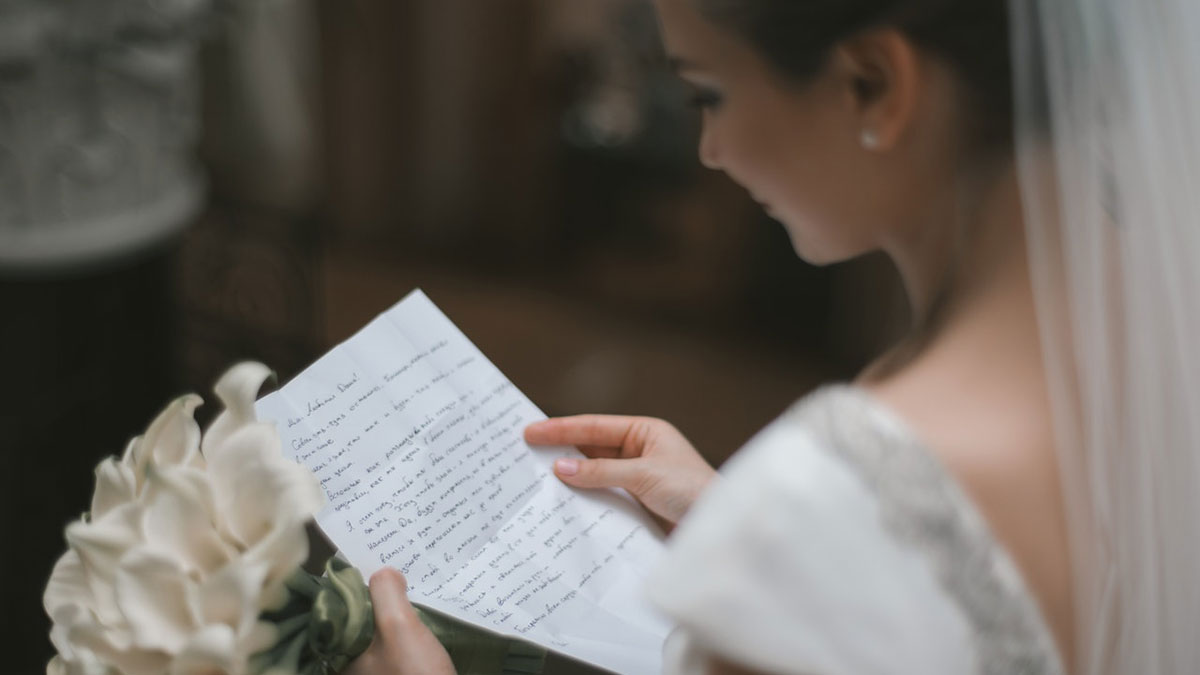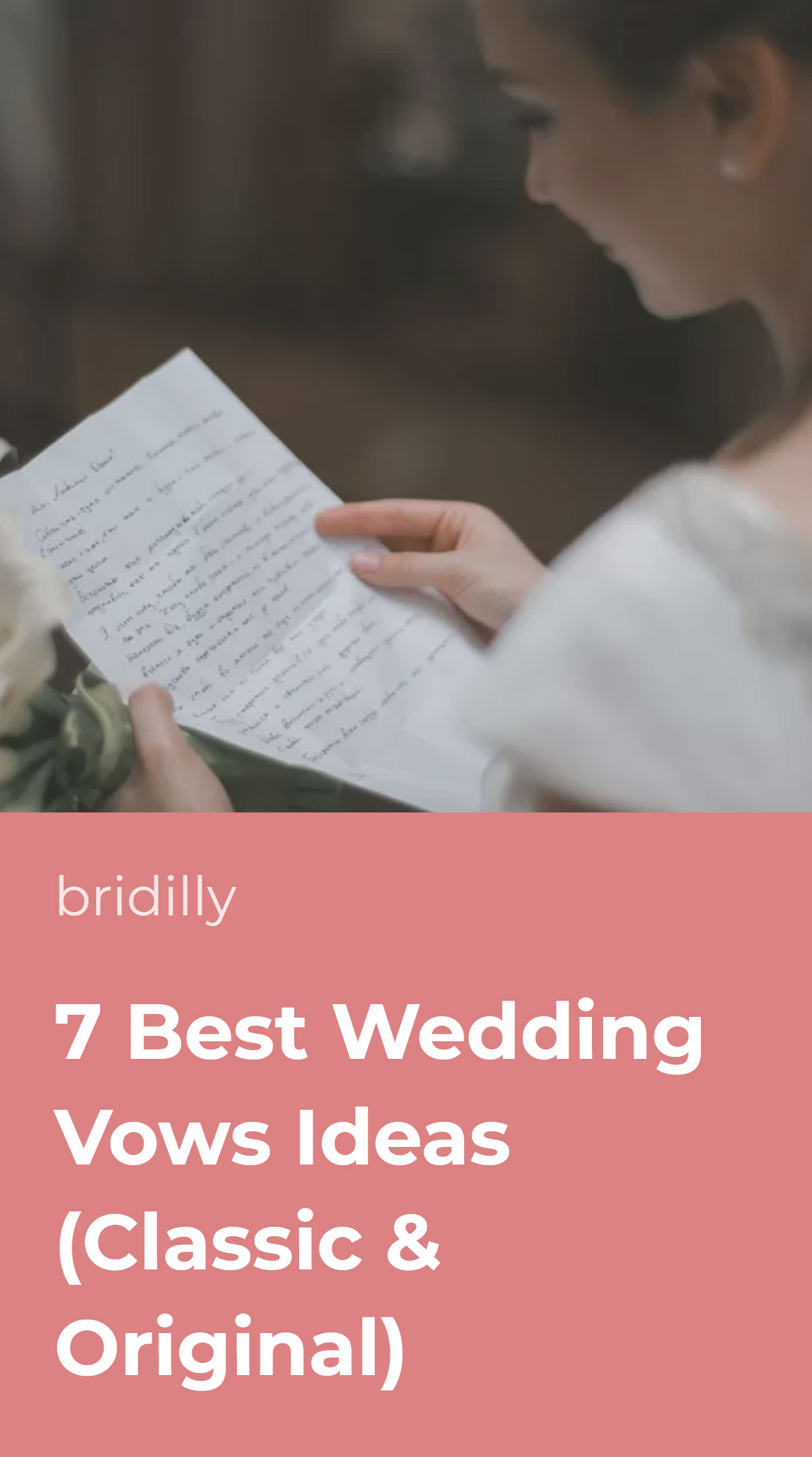Wedding vows are a core element of a wedding ceremony. You’ve likely seen couples reciting their promises to each other in numerous love movies.
However, not all wedding vows should follow the traditional “till death do us part” scenario.
Each relationship is different, and each of us has a unique personality with different feelings and preferences.
Consequently, no two wedding vows will be the same if they’re written wholeheartedly.
Expressing your feelings towards your partner, dedication, and commitment in words may be challenging even for professional writers, so it’s no wonder many couples seek help online.
The issue is, most wedding vow examples found online are quite generic.
The core objective of writing a great wedding vow is maintaining the balance between intimacy and appropriateness, romanticism and humor, sincerity and awkwardness.
Most importantly, stay true to yourself.
Table of Contents [show]
You can’t go wrong with sharing your love story in your wedding vow. Tell how you first met, how your relationship started, or about other meaningful moments of your common life journey.
Remember that you write your vow not for the wedding guests but for your partner. There’s no need to include every slightest detail unless it carries a special significance to both of you.
For instance, you don’t have to explain in your vow who “Dan” who got you acquainted is, or that the both of you attended the same college. Your partner already knows that. Dedicate more time to something truly important.
Since you aren’t writing your vow for others, think why you would include certain moments of your love story into it. Is it to remind your partner of how you fell in love? Or, perhaps, to lead to a meaningful promise?
You may wonder – how long should a wedding vow be? How long of a story will I be able to include? The average duration of a wedding vow is 45 seconds to two minutes.
Even if you talk at a rapid pace, don’t include the chronicle of every day lived together with your partner into your vow. Pick moments to talk about thoroughly.
2. Short and Funny
Many people find traditional wedding vows boring and uncomfortable. But your wedding vows should reflect your unique relationship and personality.
If long, romantic wedding vows make you feel awkward, opt for a short and funny wedding vow.
Humor never hurts the relationship, so why should it hurt your wedding vows? Of course, the jokes you insert into your vows should be appropriate to such a formal event.
Remember that there will be kids and elderly relatives listening.
Jokes such as, “We look pretty good. What is it we’re all dressed up for?” or “I love you, truly, madly, deeply… and I was thinking-maybe we should get married” are some great examples.
Bear in mind that you aren’t writing a standup. Your jokes can, but don’t have to be funny and even comprehensible for everyone attending – most importantly, they should make your partner smile.
For instance, if you always fight for the last pancake during breakfast, you may include something along the lines of “I vow to always let you have the last blueberry pancake.” This statement is deeply personal, funny, and appropriate.
However, intimate puns are best to be left between the two of you – they may make the guests feel even more awkward than the most sentimental vow full of love declarations and promises.
Perhaps, the best thing about short and funny wedding vows is that they help to eliminate stress. Reading a deeply emotional vow in front of an audience may be hard even for the most out-going people.
Your vow can be as short as you wish to – it can even consist of a single sentence. However, make sure to coordinate your wedding vow style with your partner.
If they read a long, heartfelt story and you only include a short pun, your ceremony may look odd.
3. Meaningful Promises
Many couples neglect to make promises in their vows. Meanwhile, this is an important part of a traditional wedding vow, specifying your commitment to your partner. Of course, promises aren’t mandatory, but they will most certainly be appreciated by your loved one.
Generally speaking, a vow is really just a long promise, sometimes including a story, jokes, and other elements. Promises are the heart of wedding vows, and what differs them from any other public speaking.
When writing your promises, strive to stay personal and be specific. Include generic promises such as “I promise to always love you” or “I promise to respect you” only if you really feel like it’s the most crucial element in your relationship.
In most cases, however, your love and respect for your partner are fairly obvious. Experts recommend including three to six promises in your vow, so leave some space for something more meaningful for the both of you personally.
Draw inspiration from the specifics of your relationships. Think of how you spend your days together, why you typically fight, or which of your traits you’d like to improve to please your partner.
For example, if you regularly get into arguments over you spending money on new shoes, you may include the “I vow to only buy one pair of shoes a year” promise into your vow.
If your common dream is to visit as many countries as possible, you can add something along the lines of “I promise to travel the world with you.”
You get the gist – your promises should talk directly to your partner’s heart rather than be generalized.
4. Anecdotal Wedding Vow
Anecdotal wedding vows are a lively, unconventional alternative to traditional wedding vows. An anecdote is a relatively short, amusing real-life story that often leads to the audience laughing, though not necessarily.
Think of interesting incidents in your relationship. Perhaps, you’ve encountered some unique events or people while traveling throughout Africa or made something silly yet hilarious at a formal event?
When thinking of your anecdote, consider how it’s linked to your relationship and wedding.
A funny story that led to you falling in love with your partner is a perfect choice. For example, your partner may have done something crazy to showcase their affection, or you might have overcome a serious challenge together.
However, even the most exciting story that has no connection to your relationship will only leave guests confused as to why you chose it for your wedding vow.
An anecdote doesn’t have to be funny – it can be heartwarming or sad. It doesn’t even have to be from your own life. For instance, it could be an edificatory story about love told by your grandmother when you were little.
5. Include a Cultural Reference
Instead of including a real-life story in your vow, you can convey your feelings and attitude with a story from a book, movie, or song. You can even sing a song if you have the talent!
The book or movie don’t have to be your or your partner’s personal favorite. They may not be familiar with it at all. Most importantly, the story should fit the occasion and tell something about your relationship.
However, even better if you can find such a story in a cultural piece dear to both of you or your partner in particular.
For example, if both of you admire Titanic, you may reference Jack and Rose’s love story if it fits the context of your vow.
The truth is, the reference doesn’t necessarily have to be romantic. If love for metal music is what ties you together, feel free to mention it in your vow.
6. Tell Why You Love Your Partner
A pro tip for those struggling to get their vow started is to make a list of the things you love in your partner. This list can serve as a source of inspiration or be the main element of your final vow.
Remember that you are telling this to your partner, not your guests. Strive to include reasons that aren’t overly obvious, and that will surprise them.
They likely know you love them for their support but may not expect you love them for their loud laughter.
7. Stay Personal
At the end of the day, your wedding vows shouldn’t comply with anyone’s rules and preferences but your own.
Even if your favorite grandmother insists on a heartfelt, traditional vow, you don’t have to oblige if you feel like going for a short and funny one.
It’s also best to avoid generalizations or universal statements that make your vow sound as if it was entirely derived from the internet. Each relationship is unique, and your vow should showcase that.
However, couples striving to make their vows feel special often toe a narrow line between personal and inappropriate.
Keep to a minimum inside jokes that your guests won’t understand or any references to your intimate life (obviously).
Furthermore, you both should agree on the vow content. This doesn’t mean you have to read your vow to your partner before the wedding.
But if you feel like a personal reference or pun you’ve included may offend or embarrass your partner, you may want to skip it.













No Comments Add one
Leave a Comment